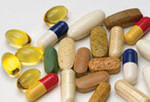US, China Biggest Culprits As Report Finds 25% Of EU Supplements...
New research has highlighted rising rates of supplement contamination in the European Union – typically by steroids – with the US and China the main sources. The report published in Food And Chemical Toxicology found enforcement actions were lacking in the EU and called for greater scrutiny of the sector, to stem a problem they measured at 25 per cent of EU.
Antibiotics Have Long-Term Impacts On Gut Flora
Short courses of antibiotics can leave normal gut bacteria harbouring antibiotic resistance genes for up to two years after treatment, say scientists writing in the latest issue of Microbiology, published Nov. 3.
Putting A Bull’s-Eye On The Flu: Detailing Influenza’s Structure For Drug...
Beating the flu is already tough, but it has become even harder in recent years -- the influenza A virus has mutated so that two antiviral drugs don't slow it down anymore. Reporting their findings in the journal Science, researchers from Florida State and Brigham Young move closer to understanding why not, and how future treatments can defeat the nasty bug no matter how it changes.
No Standard For The Placebo?
Much of medicine is based on what is considered the strongest possible evidence: The placebo-controlled trial. A paper published in the October 19 issue of Annals of Internal Medicine -- entitled "What's In Placebos: Who Knows?" calls into question this foundation upon which much of medicine rests, by showing that there is no standard behind the standard -- no standard for the placebo.
Powerful Free Radical Causes Lung Damage From Oxygen Therapy
The most toxic free radical appears responsible for much of the lung damage that can result from oxygen therapy in the critically ill or injured, Medical College of Georgia researchers report. Within just a few days, ventilators and oxygen chambers used to significantly increase oxygen levels can also dramatically increase levels of peroxynitrite, an oxidant powerful enough to break down DNA and cause proteins to malfunction, said Dr. Yunchao Su, pharmacologist in the MCG Schools of Medicine and Graduate Studies.
Doctors Often Overprescribe Antibiotics For Respiratory Infections, Pennsylvania Study Finds
Doctors frequently misuse antibiotics when treating patients hospitalized with respiratory tract infections (RTIs), according to a study to be published in the November issue of Infection Control and Hospital Epidemiology.
Use Of Medication For Insomnia Or Anxiety May Increase Mortality Risk,...
Taking medications to treat insomnia and anxiety increases mortality risk by 36%, according to a study conducted by Geneviève Belleville, a professor at Université Laval's School of Psychology. Details of the study are published in the latest edition of the Canadian Journal of Psychiatry.
Supplements Are Contaminated, Drugs Pure. Right? No, Wrong
Are megabucks of drug company advertising buying major media silence about shoddy practices?
You’ll never guess the name of the company we are about to describe. This year alone it has issued nine product recalls, over 130 million of their products are off the shelves, thirty children have died from taking its medications, its CEO has been the subject of Congressional hearings and investigations, its quality problems are called “systemic” by federal investigators, and a number its foreign executives are being investigated or are in prison for bribery charges.
Questioning The Safety Of Certain ‘Healthful’ Plant-Based Antioxidants
Scientists are calling for more research on the possibility that some supposedly healthful plant-based antioxidants -- including those renowned for their apparent ability to prevent cancer -- may actually aggravate or even cause cancer in some individuals.
Pharmaceuticals: A Market for Producing ‘Lemons’ and Serious Harm, Analysis Finds
The pharmaceutical industry is a "market for lemons," a market in which the seller knows much more than the buyer about the product and can profit from selling products less effective and less safe than consumers are led to believe, according to an analysis that will be presented at the 105th Annual Meeting of the American Sociological Association.
Heart Attack Risk Of Diabetes Drug: Experts Call For Avandia To...
A diabetes drug taken by up to 100,000 patients increases the risk of heart attacks and should be withdrawn on safety grounds, senior doctors say today. A report by the British Medical Journal says Avandia should never have been licensed in Britain because its risks outweigh its benefits. One UK expert has calculated that the drug may cause as many as 1,000 extra heart attacks a year in Britain.
Long Term Use Of Oral Bisphosphonates May Double Risk Of Esophageal...
People who take oral bisphosphonates for bone disease over five years may be doubling their risk of developing oesophageal cancer (cancer of the gullet), according to a new study published online in the British Medical Journal.















